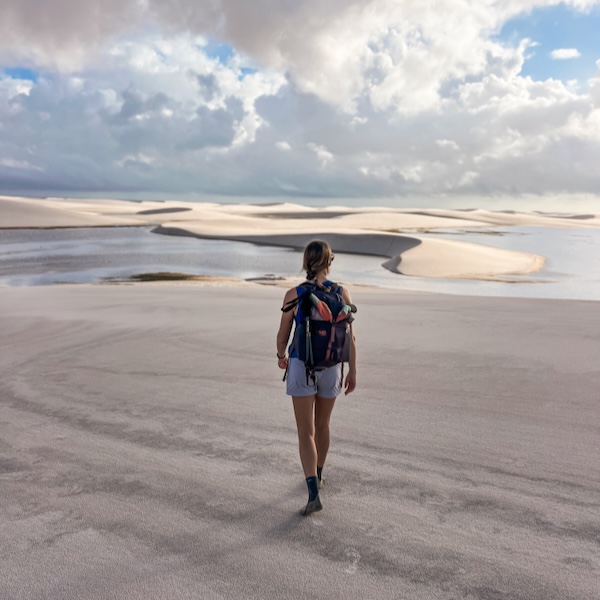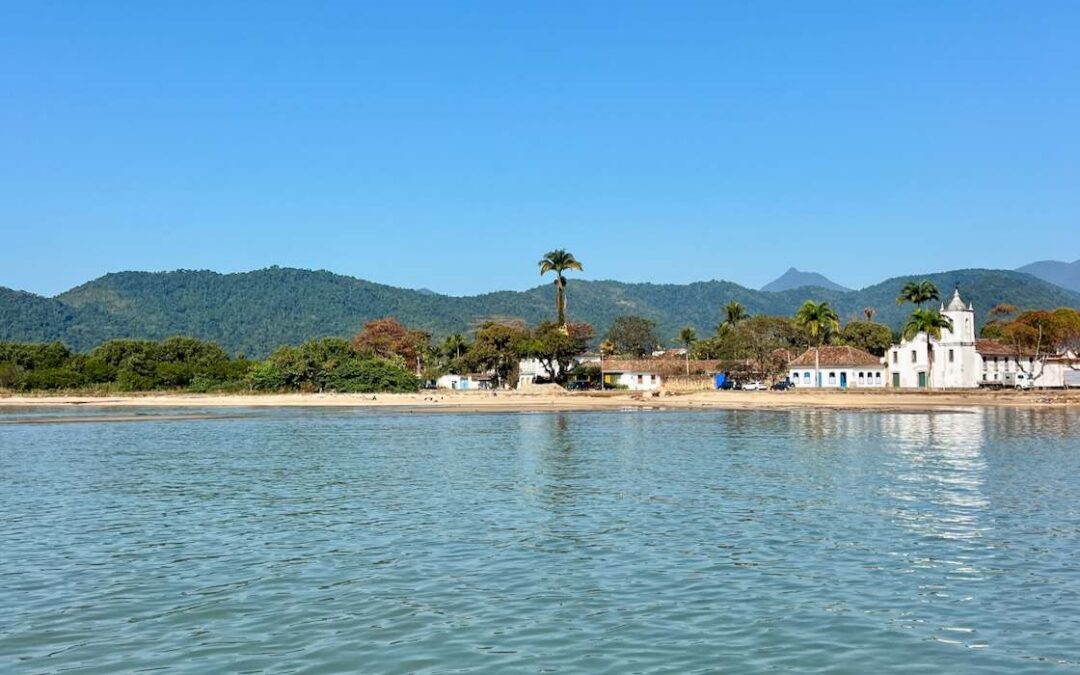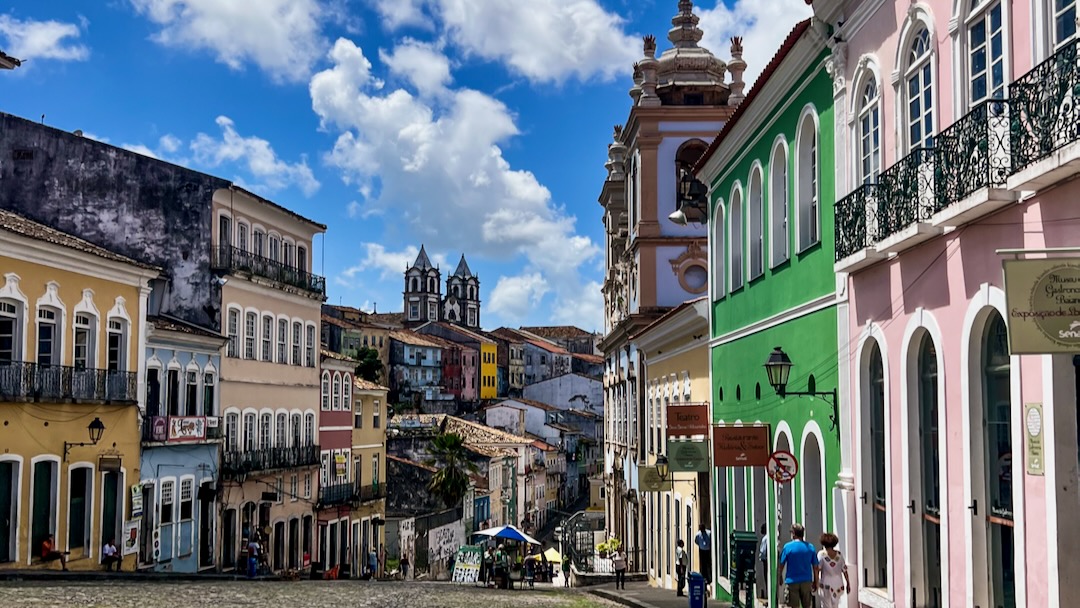1. Hike in the Tapajós National Forest (FLONA)


A visit to the Tapajós National Forest (Floresta Nacional do Tapajós) is a must for visitors wanting to immerse themselves in the Amazon rainforest, learn about its different plants and species, meet members of local Indigenous communities, and swim in the mesmerizing waters of an igarapé.
Commonly referred to as FLONA by locals, this national forest area has been protected since 1974 and is home to several indigenous communities.
The Jamaraquá Community is a popular stop for tours to FLONA.
Highlights of the tour to FLONA and the Jamaraquá Community include:
- 1-hour boat ride along the Tapajós River from Alter do Chão to the Jamaraquá Community.
- A guided 4 hour/10km hike through new and old-growth rainforest with a member of the local community where you learn about what it is like living in the Amazon, plants used for medicinal purposes, the Amazon’s infamous rubber or latex-producing trees, and animals living in the rainforest.
- Visit the 250-year-old Samaúma tree nicknamed “Samaúma Neta” or Samaúma Granddaughter
- Cool off with a heavenly swim in the igarapé. An igarapé is a shallow river or canal in the rainforest.
- Enjoy a traditional lunch prepared by the Jamaraquá Community.
- Stop at several river beaches like Ponta do Cajutuba and Muretá on the way back to Alter do Chão.
If you can only do one tour in Alter do Chão – visit FLONA!
2. Boat tour of the best river beaches in Alter do Chão


The Tapajós River is as blue and inviting as the ocean. On a hot day in the Amazon, nothing is better than going for a dip and relaxing under an umbrella on a sandy river beach. The Tapajós River is very calm and clear in the shallow areas.
During the boat tour, watch for the small grey Tucuxi Dolphins swimming in pods along the Tapajós River. They are known for leaping out of the water.
There are countless beaches along the Tapajós River. Tours are usually organized around visiting beaches north of Alter do Chão, beaches near FLONA, and beaches on the Arapiuns River.
Why is the Tapajós River Blue?
The Tapajós River is different from the Amazon and Negro Rivers in that it is “clear water.” The river carries little sediment or dissolved matter and thus retains its clear, blue coloring.

3. Hike to Serra da Piraoca for Panoramic Views of Alter do Chão

Alter do Chão’s geography is incredibly unique. From the top of the Serra da Piroca, hikers get a birds eye view of Alter do Chão, Lago Verde, the Tapajós River, and Ponta do Cururú.
The hike begins on Ilha do Amor. It is short and relatively easy – 1.5 miles out and back and 217 feet of elevation gain.
After crossing the river to Ilha do Amor, walk along the left side, past the kiosks, until you see a sign for the trail. The trail is a mix of sand and rock.
The Serra da Piroca is also an epic spot to catch the sunrise or sunset over Alter do Chão.
4. Spend of the day at the Postcard of Alter do Chão - Ilha do Amor


Ilha do Amor or Love Island is the most popular attraction in Alter do Chão. In 2009, The Guardian named this beach the best in Brazil, despite not even being on the coast.
On one side of the island is the Tapajós River and on the other is the Green Lagoon or Lago Verde.
A few months out of the year, during the dry season (June to November), visitors can walk across the exposed stretch of sand between the town center to Ilha do Amor.
During the rainy season (December to May), when the river levels steadily rise, visitors must hire a canoe for a couple of Brazilian Reals to ferry them across.
While enjoying the island’s white sandy beaches and clear, calm waters, visitors can order cold beer, fresh juices, and grilled seafood from the Tapajós River at one of the many kiosk bars.
Dulce’s Bar is a favorite on the Island. Try the caipirinha de cupuaçu, fried Pirarucu fish strips, or the Amazon’s beloved Peacock Bass fish.
The best time to visit Ilha do Amor is between August and January when the beach is at its fullest.
5. Catch the Weekly Carimbó Performance “Quinta do Mestre”

Every Thursday evening, at the Centro de Referência do Carimbó, visitors can experience the state of Pará’s unique dance and music – Carimbó.
The free, outdoor performance, is lively and energetic. You will find it difficult to resist the urge to jump in and join the dancers spinning in brightly colored skirts to the booming rhythm of the singers, guitars, and drums.
Drink stands and food vendors position themselves nearby to help fuel the street party.
If you can’t make it to Thursday’s Carimbó event, the local restaurant and bar Toca do Tatu hosts live Carimbó performances every Wednesday.
6. Cruise the Canal do Jari


The Canal do Jari or Jari Canal is a river channel that connects the Tapajós River to the Amazon River. As you travel the canal, you will notice many homes on stilts. One resident in particular has become a local celebrity.
Since 2014, Dulce Oliveira has been cultivating a water lily garden (Jardím das Vitória-régias) along the Jari Canal. In addition to visiting the garden, visitors sample a variety of snacks she has produced using water lilies.
You’ll never guess the different types of food Oliveira makes with her water lilies. They include jams, pickles, quiches, pizza dough, popcorn, brownies, and even french toast.
The water lilies bloom in May. Their growth depends on rainfall, due to the recent drought in the Amazon in 2023, her harvest was significantly impacted when we visited in 2024.
Another common stop near the Canal do Jari is Sloth Trail or Trilha das Preguiças. The trail is short and flat – just 30 minutes of walking. During the rainy season, the trail is explored via canoe.
On the trail, it is possible to see dozens of Guianan squirrel monkeys, a few sloths, and Amazon birds. Visitors also have the opportunity to taste the cream nut or castanha de sapucaia. This nut is in the same family as the more common brazil nut.
If seeing humans interact with animals makes you uncomfortable, I don’t recommend this part of the Canal do Jari since the guides at the Sloth Trail feed and touch the monkeys.


7. See the "Meeting of the Waters"


One of the Amazon region’s phenomena is the “Meeting of the Waters.”
This phenomenon occurs when the Solimões River (which eventually becomes the Amazon River) and the Negro River meet outside of Manaus and again when the Amazon River meets the Tapajós River near Santarém.
The latter Meeting of the Waters is just a quick boat ride from Alter do Chão and really is an extraordinary site to see.
The rivers’ stark color contrast is caused by differences in their temperature, speed, and sediments. On a sunny day, the colors are even more vibrant and obvious.
8. Visit the Enchanted Forest
If you visit Alter do Chão during the rainy season when the river levels erase the beaches, the best tours are through the flooded forests.
Commonly referred to as the Enchanted Forest of Caranazal (Floresta Encantada do Caranazal), the trees here are partially submerged for 6 months during the year.
Visitors cruise the forest not on foot but by boat beneath the enchanting sunlight canopy of trees.
How to book boat tours in Alter do Chão?
Boat tours can be arranged in advance or day of. I always recommend arranging tours in advance to avoid any day-of issues and to reduce stress during travel.
If you want to book your Alter do Chão boat tours in advance I recommend using Serenature. Reservation can be made through WhatsApp.
If you want to wait to book your tours until you arrive in Alter do Chão, I recommend working with the local association of river boats – Associação de Turismo Fluvial de Alter do Chão (ATUFA) – who are always present on the boardwalk of Alter do Chão.
Almost all boat tours function like this – 9 am departure time, various tour stops, stops at nearby beaches, lunch (not included with price), and a stop for the sunset before returning to Alter do Chão around 6 pm.
9. Catch the Sunset at Ponta Cururu


Watching the sunset at Ponta Cururu is a magical experience in Alter do Chão. During the dry season (June to November), a sand bar forms near the Praia do Jacaré.
Most boar tours finish the day at Ponta Cururu. On the sand bar, there is a small drink stand. I recommend ordering a Caipirinha with Jambu and Ginger.
It is common to see the grey Tucuxi and pink Boto dolphins at Ponta Cururu during sunset.
10. Dive into the Local Cuisine

The flavors and food of Pará are some of my favorites in Brazil.
Alter do Chão’s cuisine is sometimes referred to as “Tapajônica” – a fusion of Amazonic and Paraense (from the state of Pará) that relies on methods, ingredients, and traditions derived from the Tapajós River region.
Casa do Saulo is one of the best restaurants in Alter do Chão that represents the Tapajônica cuisine.
It is often included as a lunch stop during boat tours since it is outside of Alter do Chão, towards Santarém.
At Casa do Saulo, I recommend the tucunaré (Peacock Bass) or tambaqui fish, caboco breaded shrimp, pastels (a pastel is like an empanada) with local Marajó cheese, braised duck with tucupi and jambu, and to drink, a cupuaçu moscow mule.
In Alter do Chão, I recommend Ty Comedoria e Bar for excellent Tapajônica cuisine.
Must-try flavors while in this region of Brazil include:
- Jambu (a leafy plant)
- Cupuaçu (fruit)
- Banana da Terra
- Tucupi (manioc sauce)
- Castanha do Pará (Brazil nut)
- Tapioca
- Taperebá (fruit)
- Graviola (fruit)
- Cumaru (tonka bean nut similar to vanilla)
A fun way to try some of the exotic fruits and nuts is through ice cream. Alter do Chao has several ice cream kiosks and shops in town. I recommend Boto Gelato, Sorvete Alter, and Alter nas Nuvens.
What is Jambu?
Jambu is a staple in Paraense cuisine. It is a Brazilian herb that when indigested produces a brief mouth-numbing sensation.
Jambu has been important to the Indigenous communities of the Amazon for hundreds of years. Its numbing qualities made it useful in treating ailments such as toothaches.
Today though, Jambu has become much more trendy and is found in many restaurants and bars throughout Northern Brazil.
Two of Jambu’s most popular uses in gastronomy are in the traditional broth-based dish called Tacacá and in Brazil’s famous cocktail – the Cairpirinha.















0 Comments